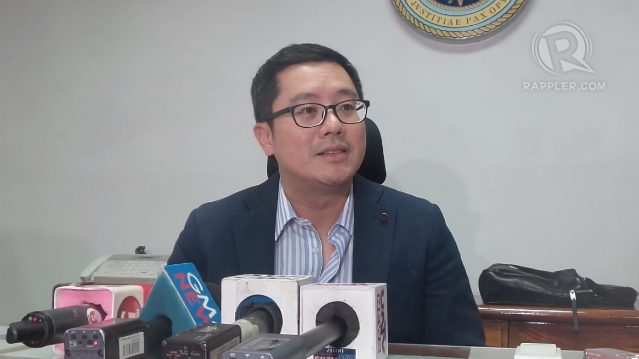SUMMARY
This is AI generated summarization, which may have errors. For context, always refer to the full article.

MANILA, Philippines – Even online content must be subject to certain existing restrictions on free speech, the Department of Justice (DOJ) believes.
DOJ Assistant Secretary Geronimo Sy insisted Thursday, October 30, that the Internet must be regulated such that social harms – like treating children like commodities through pornography – are prevented.
“We’re selling children like commodities, like shoes. Hahayaan lang natin (Are we just going to let this happen)?” he asked.
Sy, who heads the DOJ Office of Cybercrime, said Internet users must be denied access to sites that offer child pornography, as this is the best way to cripple the growing trade.
“Online child abuse materials are wrong per se. These are criminal. There’s no reason to allow that to pass through your system,” he added.
Sy likened the regulation eyed by the department to other limitations on one’s freedom of speech, which in certain countries now extend to the World Wide Web. These include a ban on sites that incite violence or encourage terrorism.
The DOJ earlier announced its intention to block child pornographic sites on most computers, smartphones, and tablets through a partnership with local telecommunication companies and internet service providers (ISPs).
An automated system of blocking must be enforced due to the volume of sites involved, he added.
Control the source
The National Bureau of Investigation earlier found that cash-for-cybersex operations involving minors in the country have proliferated in impoverished areas.
The target market of children’s nude photos or, in some cases, actual live videos are mostly foreign Internet users.
Family members of the exploited minors are often involved, making it harder for the victims to speak up about the abuse. (READ: NBI: Online sex trade cottage industry in PH)
As the “Philippines is the net supplier” of child pornography and “Western countries are the net user,” Sy said the “import-export issue” can be dealt with by controlling the source or the supplier.
“Kung nakikita natin na ina-access ‘yung sites, dapat hindi na maka-access (If they’re able to access the sites, they should be disabled from doing so)…. So that should be the approach. Telcos can do it if they want to,” he said.
He added that “technology is not an issue” but the political will to enforce the proposal.
“Kung gusto lang, magagawa (If we really want, it can be done),” he said.
As early as January 2014, the National Telecommunications Commission (NTC) already ordered ISPs to “install available technology, program or software that will block access or filter all websites carrying child pornography materials.”
Sy said the NTC issued the regulation “late” but the implementation “should be anytime now.” – Rappler.com
Add a comment
How does this make you feel?
There are no comments yet. Add your comment to start the conversation.